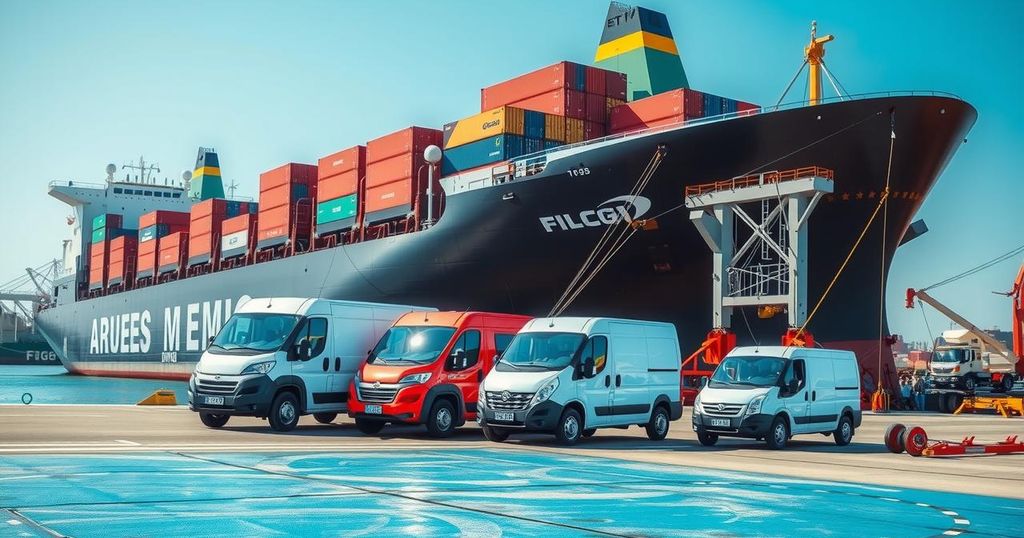BYD Surges Electric Vehicle Shipments to Brazil Ahead of Tariff Hikes
BYD is rapidly increasing electric vehicle exports to Brazil ahead of upcoming tariff hikes. Sales for electric and hybrid vehicles surged, with BYD’s sales climbing by 328% last year. However, concerns grow over the company’s commitment to local production, following labor issues at a factory site. Brazilian automakers express worries about the impact of imports on local investment.
In a significant move, BYD has sharply increased its electric vehicle exports to Brazil, just ahead of a looming tariff hike. Reports indicate that the Chinese automaker shipped a record number of electric vehicles (EVs) to the South American nation, especially as uncertainties grow regarding its future production aspirations there. The Brazilian Association of Electric Vehicles (ABVE) noted that sales for both fully electric and hybrid cars soared by a remarkable 85 percent, with over 170,000 units expected to be sold in 2024, marking a new high for the country, which ranks as the world’s sixth-largest car market.
Last year, BYD experienced a staggering 328 percent increase in sales, totaling 76,713 units in Brazil, contributing significantly to the overall electric vehicle sales, which comprise around 7 percent of new car transactions. However, the favorable import tariff regime that initially drew BYD to Brazil in 2015 is facing a crucial transformation. Starting January 2024, imported EVs will incur a 10 percent tariff, which will incrementally rise to a peak of 35 percent by July 2026, according to government forecasts.
As the tariff increasingly impacts prices, the current import tax of 18 percent is set to climb to 25 percent by July. The Brazilian automakers’ association, Anfavea, is vigorously advocating for bringing this increase forward. A government representative confirmed to Reuters that the proposed changes are currently under review. Meanwhile, it is estimated that Chinese carmakers will boost their exports to Brazil by nearly 40 percent this year, potentially reaching about 200,000 vehicles. Notably, BYD has already shipped around 22,000 vehicles in the first half of the year.
Part of this aggressive import strategy has been facilitated by a government policy permitting toll-free imports of specific EVs, with limits up to US$169 million for plug-in hybrids and US$226 million for battery electric vehicles, to be honored until July 2025. Despite consumer enthusiasm for affordable electric cars, local automotive firms are voicing concerns that BYD’s surge in imports signals a withdrawal from previously announced commitments to establish production facilities in Brazil.
Complications arose when BYD’s acquisition of a former Ford plant hit a serious hurdle last December due to reports of construction workers living in severe conditions. Although BYD severed ties with the contractor involved, they remain entangled legally, causing production timelines to shift to December 2026, as investigations into the labor issues persist. Igor Calvet, Anfavea’s president, expressed support for new automotive ventures in Brazil but expressed apprehension over the influx of imports that could undermine local investment and production.
Concerns have also been raised about BYD’s local supplier networks; reportedly, no contracts have yet been established or relationships developed with Brazilian suppliers, which is contrary to the usual progress expected within 18 months of a factory opening. “Even if the factory is here – what value is it really adding if the components, development, and technology is all from abroad?” said a local official.
On a positive note, rival Chinese manufacturer GWM, which acquired a factory in Brazil in 2021, is gearing up to launch production of its hybrid Haval H6 SUV next month. Ricardo Bastos, GWM’s director of government relations and ABVE president, highlighted ongoing discussions with approximately 100 suppliers based in Brazil to forge contractual agreements. However, he acknowledged that the necessary infrastructure for electric vehicle component production is still lacking in the country.
In summary, BYD’s increased EV shipments to Brazil reflect a strategy to capitalize on favorable import policies before looming tariff hikes. While electric vehicle sales surge in Brazil, questions linger regarding BYD’s commitment to local production in light of recent setbacks and advocacy from local automakers. The evolving landscape may indicate a struggle to balance imports and domestic manufacturing, posing challenges for firms like BYD amidst a transforming regulatory environment.
Original Source: macaonews.org




Post Comment